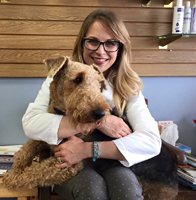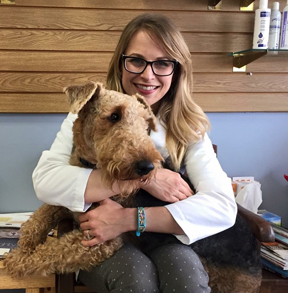Majority-female profession must support working mothers better, veterinarian says

Sarah Sims 288

Photo by Elizabeth Himes
Dr. Sarah Sims and her dog, Red.
We should be proud that our profession is unafraid to discuss its shadows and shortcomings. Rarely do I pick up a veterinary publication these days without finding an article on the climbing debt-to-income ratio, underrepresentation of women in leadership, compassion fatigue or the rising incidence of addiction and suicide. Prominent veterinary organizations, including the American Veterinary Medical Association, never miss an opportunity to talk about our problems, but at a certain point, shouldn't we be expecting — or better yet, demanding — actionable solutions from our current leadership?
In fact, that was a suggestion of the former AVMA chief economist Michael Dicks, PhD, who wrote in a recent commentary that he believes AVMA leaders brushed off his team's suggestions for protecting the profession's economic future. In the same way, AVMA Life trustees are abandoning a small but powerful opportunity to support the work-life balance of many female veterinarians — a cohort that comprises more than 60% of the profession.
I'm referring to an AVMA Life insurance policy "modification" that fails to protect the disability benefits of new mothers. In a letter to policyholders dated July 12, AVMA Life announced two major changes to its short-term disability offering: Coverage must be in effect for at least a year before benefits can be paid as a result of pregnancy. And after Nov. 1, benefits for new mothers who have had uncomplicated, routine births max out at 30 days rather than the previous 90-day limit.
Let's take a closer look at what is at stake.
Letters

New census findings from the AVMA show an alarming decline in practice ownership among younger veterinarians at the same time that women have come to outnumber men in the profession (38% male in 2018 compared with 50% male in 2008). We clearly need a plan for attracting women to practice ownership if we want to keep vast numbers of individual practices out of the clutches of corporate consolidation.
I bought my practice in 2017, one month before the birth of my first child. I would never have been able to do so without the support of my predecessor, who also is a mother and was a practice owner at a time when men far outnumbered women in the profession. To this day, I find it challenging to balance ownership and maternal responsibilities, especially as I expect a second child.
Parental leave is a hot topic in our country right now; the bipartisan consensus seems to be that our culture should place a higher value on supporting families (although nobody can seem to agree on how to do so on a national scale). Maternity leave is a significant stressor for any practice, let alone a one-doctor practice like mine. After all, it is not only my personal finances at stake here. I have a staff that will need to be paid during my leave, as well as a relief veterinarian who will work in my absence.
I was so relieved to have AVMA-endorsed short term disability and professional overhead insurance plans to help supplement the huge financial losses my business would be incurring during this physical, mental and emotional transition. Shortly after buying the practice, I switched from an Aflac plan to the AVMA plan because their benefits were more comprehensive and their premiums were ridiculously affordable.
My relief quickly dissolved when I received notice of the benefits change. Not only is this a vast decrease from their current offering, but it is 25% shorter than the usual short-term disability benefit for childbirth (six weeks, according to Northwestern Mutual Life, and eight weeks for cesarian-section deliveries).
Furthermore, the benefit is to end two weeks before most obstetricians will even follow up on the physical recovery of their postpartum patients. In the letter, Trustee Chair Dr. Joe Kinnarney writes that "adjusting the pricing to maintain a 90-day policy would result in a cost to members that would be unrealistic for the majority of our insureds."
However, the board failed to discuss this dilemma with policyholders before making the decision. And rather than looking for creative solutions, such as a fair increase in premiums for women of child-bearing age (those of us most "at risk" for filing the costly claims in question), they decided to simply take an ax to the benefit and call it a day.
I don't think this decision was made by the AVMA Life Board of Trustees with malice or misogyny, but I do think it shows a lack of foresight and alignment with the overarching trends in the trenches of the veterinary profession today. Shouldn't a profession whose future is in the hands of graduating classes that today are more than 75% female lead the way in offering the support women need to balance early motherhood and career?
Only a few years ago, the AVMA released an algorithm for new graduate salary negotiation that calculated a lower number for women to take to the negotiation table compared with equally qualified men. The AVMA course-corrected on that public-relations nightmare fairly quickly, but it is another example of how oblivious our leadership can be in discussions involving the needs of an increasingly female-dominated base.
I am not alone in asking for reconsideration of the AVMA Life maternity leave policy change. An online petition on the topic has drawn 16,800 signatures and counting.
When the AVMA House of Delegates meets this week in Washington, D.C., I sincerely hope this topic is brought up. We all need to hold our leaders accountable for the culture they foster, and remind them to attend to the changing needs of present and future veterinarians. Demographics suggest that the future of veterinary medicine lies in the hands of women, many of whom will endure childbirth and need disability coverage to supplement their incomes during the postpartum period.
I urge the AVMA Life Trust to reconsider its reductions of benefits for maternity claims. The earlier we arm women with the tools to balance career and family responsibilities, the more likely we all are to have a stable and prosperous profession in the years to come.
About the author: Dr. Sarah Sims graduated from the University of Missouri (Mizzou) College of Veterinary Medicine in 2013 and owns a small companion-animal practice in Kansas City, Missouri. She shares a life with her husband, son and two dogs.